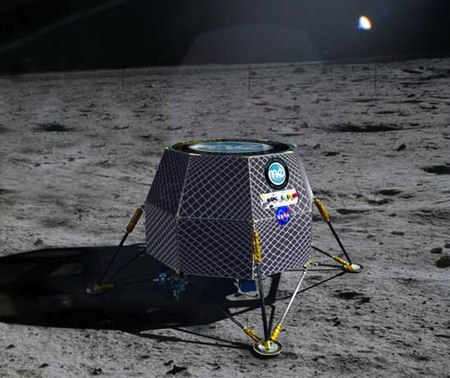
Illustration of Moon Express's proposed lander. (credit: Moon Express)
On Wednesday, during a summit of the teams participating in the Google Lunar X PRIZE (GLXP) competition in Washington, Moon Express announced it was acquiring another team, Next Giant Leap (NGL). The acquisition will “leverage and carry forward the substantial work” done by NGL and its partners, although the release does not go into specifics about how NGL’s technology or other capabilities will be integrated into Moon Express. Moon Express’s Bob Richards tells MSNBC that NGL’s control system, developed by Draper Labs, is perhaps the biggest part of the acquisition.
Terms of the acquisition were not disclosed; Richards would only say the deal “involved a payment to Next Giant Leap” (unclear if it was cash, equity, or some combination), and that two NGL co-founders, Michael Joyce and Todd Mosher, would join Moon Express as advisors.
While this specific deal might have been a surprise, the fact that teams are acquiring one another, and making other hard decisions about their future plans, should not be. “This year is going to be a very interesting year: it’s the first of the two shake-up years when reality hits and teams really figure out whether they need to move forward or decide they have gone as far as they can go,” said Alex Hall, senior director of the Google Lunar X PRIZE, during a talk at the National Space Society’s International Space Development Conference (ISDC) in Washington on Sunday.
Although the GLXP prizes remain available through the end of 2015, meeting that deadline requires making some decisions soon, such as making launch arrangements, and raising the money needed to pay for those launches. “That is the big issue for the majority of the teams, being able to get the funding in time to make those down payments, or to put their parts together if they’re building a rocket,” she said.
Hall showed the results of a survey of the then 26 teams participating in the competition, where 46 percent said they had raised less than a quarter of the funding they needed, and 35 percent said would merge with another team or drop out of the competition if they didn’t raise “major” funding this year. “If you’re not at the point by the end of this year where you’re substantially far along in both your spacecraft and your launch contract negotiations, you’re probably not going to be making an attempt before the end of 2015,” she said.
So, expect some more changes among the 25 teams now remaining in the competition in the months to come, as some seek to merge to improve their chances to win the prize, while others may have to throw in the towel. “Things really are going to get very interesting,” Hall said.

Leave a Reply